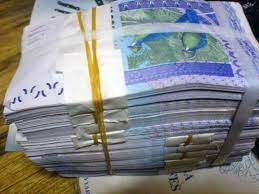Fast backlinks and Guest-post hosting
Finance minister presents D8.6B Budget for 2014
Friday, December 20, 2013The Finance and Economic Affairs minister Thursday made a landmark presentation of the 2014 budget at the National Assembly, disclosing that the total domestic revenue and grants for the upcoming year is estimated at D8.6B from D7.6B in 2013.
In his marathon speech, listened to by the vice president and Women’s Affairs minister, Cabinet ministers, senior government officials, members of the civil society, members of the Diplomatic and Consular Corps, the media and development partners, Finance Minister Kebba S. Touray said included in the total revenue projection is a budget support of D313M from the World Bank (WB) and the African Development Bank (AfDB).
He told the House that the objective of the policy is to contain inflation, stabilise the Dalasi and to increase domestic savings for programme financing. The 2014 budget, he said, will also focus on fiscal prudence aimed at minimising the growing deficit being financed by costly domestic borrowing.
Minister Touray outlined the priorities of the budget, mentioning that sustainable agricultural development has and will continue to remain a priority for the government. The government under the leadership of President Jammeh in partnership with development partners, he said, will continue to invest in the agricultural sector.
“Focus on other productive sectors such as science and technology, infrastructure and energy will remain priorities for government as key platforms to support poverty eradication,” he indicated.
Agriculture
Touray underscored the importance government attached to agriculture, saying recent times have seen the intensification of investment in the sector as evidence by the scaling up of its resource envelope from less than 3 percent of government revenue in 2011 to about 8 percent.
“2013/2014 also witnessed the launching of two major development projects namely; FASDEP (Food Agricultural Security Development project) and the Agricultural Land and Water Management Development Project (NEMA). The total investment for the two projects is about US$130 million,” he disclosed.
He noted that the 2013/2014 farming season is expected to show a remarkable recovery from the drought experienced in 2011/2012 farming season as total cereal production is estimated to be 229, 584 metric tons.
Fisheries and Water Resources
In the area of artisanal fisheries, he informed that the government in collaboration with its development partners is providing fisheries infrastructure facilities and equipment throughout the country.
“Within the framework of implementation of the GAFDP (Gambia Artisanal Fisheries Development Project), rehabilitation works at Bintang, Tendaba, and Albreda fish landing sites are completed and the double surfacing of the 11 kilo meters roads to Tendaba and Bintang have also been completed. This will greatly ease the transportation of fish and fisheries products to markets,” he indicated.
Energy
For the Energy sector, Finance Minister Touray said the Ministry of Energy in collaboration with the National Water and Electricity Company (NAWEC) are working to increase the generation, transmission and distribution capacity for better quality and reliability of electricity services to make it more accessible and affordable.
“As part of measures to put NAWEC on a better financial footing, government has requested and recently secured a grant to the tune of US$32 million from ECOWAS to support NAWEC’s operating costs,” he disclosed.
Petroleum
On Petroleum, he indicated that The Gambia National Petroleum Company (GNPC) has successfully completed the construction of three petroleum service stations at Bundung, Abuko and Bansang at a total cost of about D50 million. This expansion, he said, is meant to add capacity to existing stations in Kanifing, Banjul, Brikama, Farafenni and Soma, making a total of nine stations.
Forestry and Environment
The government of The Gambia, according to him, is committed to intensifying efforts towards mitigating environment challenges, indicating that this is all the more reason why it continued to strengthen imitative such as ‘Operation Clean the Nation’ and the enforcement of the Anti-littering law.
Tourism
The tourism sector, he told the gathering, continues to show robust growth with impressive contribution of 12-15 percent of the Gross Domestic Product (GDP). The sector, he added, has largely been and continues to be a stabilising factor for the economy. “Tourism arrivals are projected to increase from 125, 528 in the 2012/2013 Winter Season to 200, 000 in the 2013/2014 Winter Season,” he disclosed.
This positive developments, he said, is as a result of robust marketing efforts by the Ministry of Tourism and Culture through The Gambia Tourism Board (GTBoard), noting that the government is developing strategies to promote The Gambia as an all year round tourist destination.
Trade
On Trade, the minister informed that the Ministry of Trade, Integration and Employment, continues to pursue and implement trade related programmes as defined in the National Trade Policy. He said in the area of integration, the Ministry coordinated the implementation of the ECOWAS protocol on the inter-state Road Transit effective 15th July 2013. “The objective of this protocol is to facilitate the movement of transit goods in the sub-region,” he indicated.
Communication and Information Technology
For this sector, Touray recalled the launch last year of the World Bank funded project of US$35 million Africa Coast to Europe (ACE), making the Gambia’s first submarine cable landing station.
“The station, managed by the Gambia Sub-marine Cable Company, is a consortium of internet service providers and governments. The ACE will address high capacity bandwidth requirements and reduces ICT transaction cost,” he said.
Transports, Works and Infrastructure
The Finance minister disclosed different road projects are ongoing at various stages of implementation, designed to provide transport links throughout the entire country, The asserted that the government has made heavy investment in the construction of the South Bank and the North Bank trunk roads.
“The Mandiba-Soma road, which links Banjul to Basse on the South Bank, is near completion. Out of five regional roads embarked upon by the government, all four have been completed and the remaining one, Basse to Vellingara (in Senegal) is in progress and work is expected to be completed by the end of the year,” he revealed.
The contract for the 25 km Brikama-Dimbaya-Darsilimi road project, according to him, was signed on 29th October 2013 for a sum of D413 million dalais. He disclosed that the consultant for the AfDB financed Trans-Gambia Bridge has been appointed and the process for the appointment of the contractor is at an advance stage, with construction works is expected to start in 2014.
Basic and Secondary Education
In the area of Basic and Secondary Education, he observed that the Ministry of Basic and Secondary Education continues to provide quality and accessible basic education. To this end, he said there have been considerable increase in enrollment at all levels.
“Lower Basic Schools’ enrollment increase from 244, 000 in 2012 to 257, 000 in 2013 representing increase in Gross Enrollment Ratio from 90.2 percent to 92.7 percent. Similarly, upper basic school enrollment increased from 84, 895, which translate into increase in gross enrollment ration from 66.7 percent to 70.1 per cent whilst senior school enrollment increased from 40, 761 to 45,670 representing an increase in enrollment ration of 33.7 percent to 37.7 percent,” he revealed.
Higher Education
On higher education, he said the focus continue to be placed on producing home trained graduates, with relevant knowledge and skills for full participation in the socio-economic development of the country. This, he said, is evident by the large number of graduates trained at the University of The Gambia since its establishment in 1999, most of whom are now fully engaged in both the public and private sectors.
“It is gratifying to note that the School of Medicine and Allied Health Sciences of the UTG has produced close to 100 trained medical doctors and presently over 300 Gambian trainee doctors are pursuing courses in Medicine and Allied Health Sciences,” he disclosed.
Health and Social Welfare
The Finance minister told the Assembly that significant improvements have been registered in the reproductive and child health indications. He indicated that maternal mortality ration has been reduced to 433 per 100, 000 live births (based on the Gambia Demographic and Health Survey Preliminary report, 2012) compared to 730 per 100, 000 live births in 2001. The Infant mortality rate, he added, has also reduced to 54 per 1000 live births from 75 per 1000 live births.
“The Gambia is the second country in Africa to introduce Pneumococcal Conjugate Vaccine into its routine Expanded Programme Immunisation services, the aim of which is to reduce both morbidity and mortality due to pneumococcal diseases amongst children under five years of age.”
Youth, Women Empowerment and Population
The Government, he told the gathering, remains cognizant of the pivotal role that youth and women play in sustainable economic development as evident by their continued interest and participation in agriculture, fisheries and sporting activities.
“Youth-led farming activities have been the cultivation of 47 farms totaling 118 hectares which will not only contribute to our food security target but will also provide employment for those involved,” he informed.
The Women’s Bureau, he said, has also continued to conduct constructive dialogue at policy and grass roots levels to increase awareness on the content of the Women’s Act 2012, and Gender and Empowerment Policy 2010-2020.
Foreign Affairs
The minister reaffirmed that the government will continue to deepen and expand its bilateral and multilateral cooperation, friendship and concord based on mutual respect, national interest and reciprocity.
Defence
Describing peace and security as priceless, Minister Touray said government through the budget and other bilateral assistance will continue to support initiatives in Defence. He pointed out that in the regional and sub-regional context, government will continue to support peace-keeping missions in line with AU, ECOWAS and UN initiatives and mandate.
Conclusion
The Finance minister concluded by stating that despite the global and domestic challenges including the international financial crisis and the recent drought, The Gambia still remains resilient.
“To ensure macroeconomic stability and sustained economic growth, the high level Economic Council set up by the president and chaired by the vice president will continue to monitor budget implementation and macroeconomic developments,” he assured.
The motion was seconded by the Majority leader and National Assembly member for Serrekunda East, Hon. Fabakary Tombong Jatta.
Author: Alieu Ceesay & Aji Fatou Faal
Finance minister presents D8.6B Budget for 2014
Outils
Vos reglages
- Plus petit Petit Moyen Grand Plus grand
- Default Helvetica Segoe Georgia Times
- Mode de lecture








